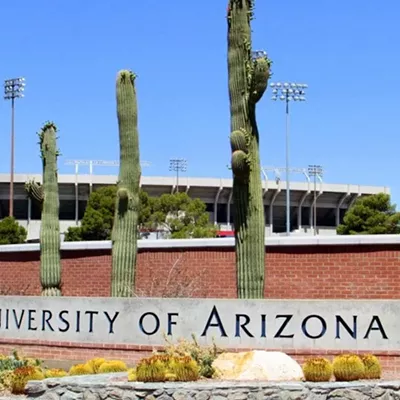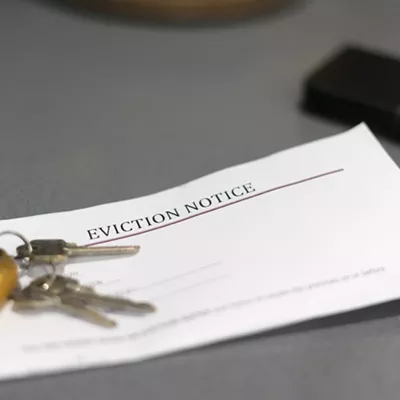For years, university officials wanted to limit enrollment to 35,000. Recent budgetary and legislative pressures, however, meant that figure has been discarded, replaced by a number of 40,000 or more.
As a result, more student housing is required, so the private sector is stepping in to fill the void. Two large apartment projects recently opened on Stone Avenue, both with reputations as party places, and another is nearing completion.
Closer to campus, a Phoenix-based developer is planning a six-story mixed-use project, where the Bank One on Park Avenue near Speedway Boulevard now sits. Hoping to open it by August 2005, Nick Glimcher wants to provide approximately 150 apartments, 50,000 square feet of retail space and four levels of underground parking.
Glimcher says the current increase in university enrollment, along with the overall strength of the campus, led him to propose the project. In November, he is expected to ask the Tucson Planning Commission for a neighborhood plan change. If that is approved, he will follow up with a rezoning request for the property.
Local architect Thomas Sayler-Brown, who is assisting on the proposal, says it is intended to be a quality building with high-end apartments which can accommodate both students and university faculty and staff members.
"We're looking for something special," Sayler-Brown comments, "not an Animal House."
A new fraternity that recently opened in the West University Neighborhood might not be Animal House-bad, but it has some residents upset. Phi Kappa Psi moved into a large, historic residence on University Boulevard at Second Avenue in July.
"Its been like living next to a 24-hour 7-Eleven," says neighbor Peter Wilke, "They are not good neighbors. They communicate by yelling profanities at each other, and it is worst at 1:30 a.m. after the bars let out. It's intolerable, but it happens most nights."
Wilke says he and others call the police, but that doesn't solve the late-night noise problem. He also lists litter, car alarms and parking concerns while admitting many of the fraternity's 50 members are "nice kids" and that things could be worse. In the end, he says residing next to the Greek house "certainly takes away from our quality of life."
To try and minimize conflicts like this, years ago, the University adopted rules in order to recognize Greek houses located off campus, but they are toothless. To hold "official" functions, an off-campus Greek house is supposed to gain permission for its location from the surrounding neighborhood association. Even if they don't get it, they can still operate.
Last month, Phi Kappa Psi requested approval for its house from the West University Neighborhood Association; four other fraternities already exist in the association's boundaries. But the frat was turned down.
"In general, we're not interested in any new fraternities," says association president Mark Pettit. "They're nice kids, but when they live in our neighborhood, there are real problems."
With an increasing enrollment, the university has a waiting list for new Greek houses. And while another 476 beds will be added to dorms next fall, plans for more university dormitory rooms are sketchy after that. To meet the increasing demand for living quarters, private-sector developments are popping up around campus.
One of those is the controversial proposal for condominiums and retail space planned for the corner of Sixth Street and Campbell Avenue (See "Building Up," April 24). Some people in the surrounding Sam Hughes neighborhood welcome the project, but others see it as something that will negatively affect them. To address at least some of their differences, the developer and neighborhood association have been working on an agreement regarding such things as noise and parking.
While this project is on a fast track to rezoning approval, one Sam Hughes resident is trying to slow the process down. Longtime community activist and urban planner Paul Mackey has filed a lawsuit, alleging the city of Tucson illegally gave away land to a developer.
Mackey also believes the trend of more and more student housing being built around campus is a dangerous one; he doesn't believe developers when they say they want a mix of people. Mackey says the city of Tucson and university officials are "putting their heads in the sand over the impact of these projects which create tremendous pressures on neighborhoods.
"We need to explore housing options besides these private student dorm things," Mackey says. "The city and university aren't willing to talk about the increasing problem. Any other place would be trying to stabilize the neighborhoods around the campus."
Instead of constantly battling over the issue in Tucson, Mackey wonders, "Why not discuss it in a positive way? What does it take to do that?"









